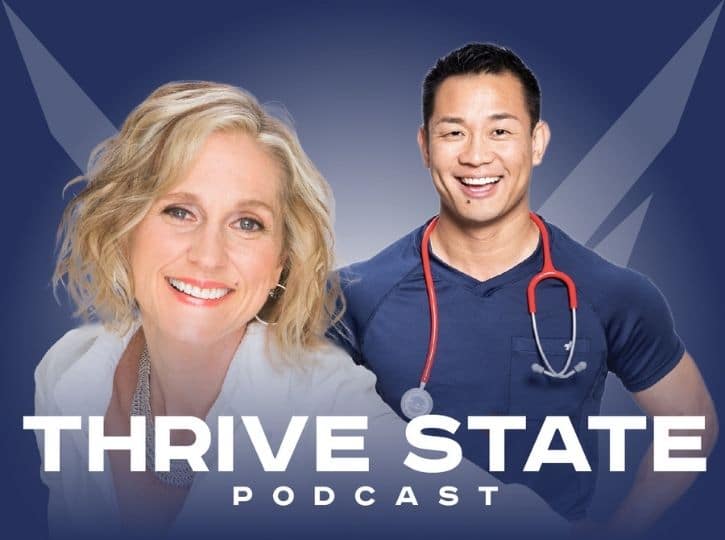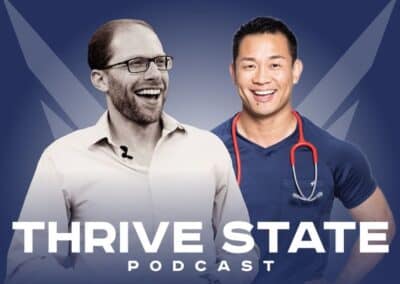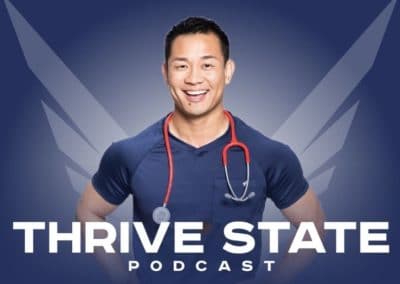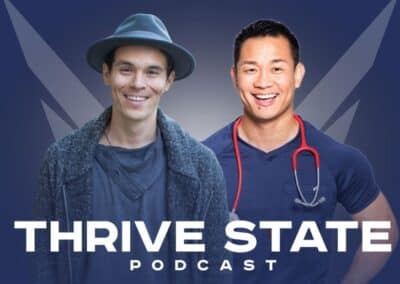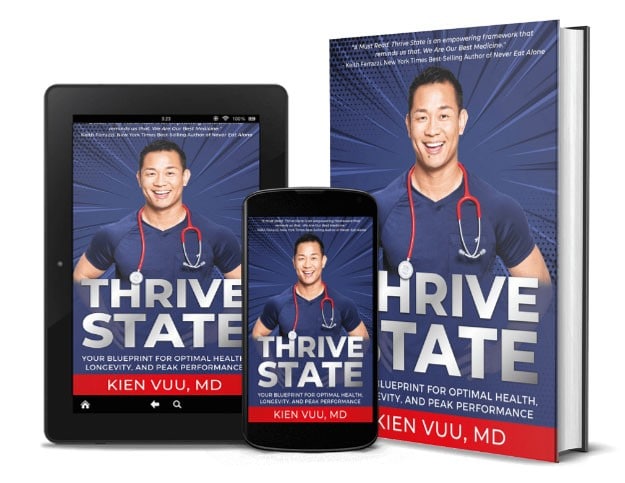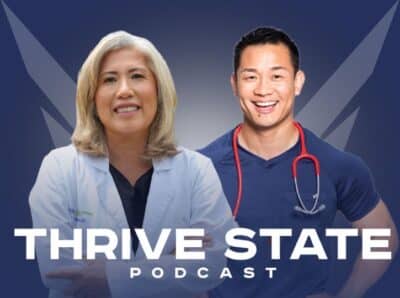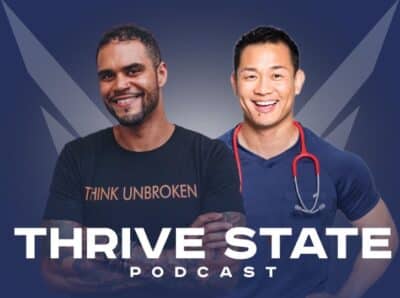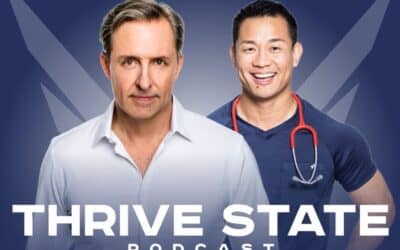Episode 33: Tricia Nelson
Does any of these sound like you?
…love to snack constantly in between meals
…feels perpetually hungry
…can’t resist the ooey-gooey chewy cookie and candy stash
…binge-eat when stressed from, school, work, or relationships
…binge-eat on weekends while marathon-watching of your newest fave series
…eat your heart out but feel bad afterwards
…been trying to change eating habits but couldn’t sustain
…able to lose weight for a while but bounce back like a yo-yo to unhealthy weight
If you’ve been nodding for the last 20 sec, then I hope this episode breaks it down for you in the most honest but compassionate way—you might be an EMOTIONAL EATER.
But don’t feel so bad and down. In my book Thrive State, we have a length of info-packed discussion on how emotion drives so much of our behavior. Thus, as humans, we have a wiring for emotional eating.
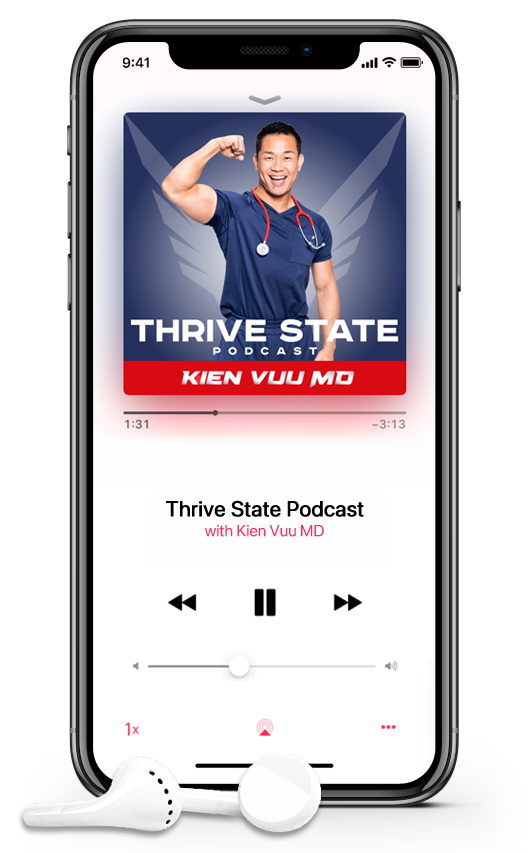
Emotional connection with food is not at all bad. Remember our episode with celebrity chef and clinical nutritionist, Serena Poon? Food is a vehicle of our and the Earth’s energy!
That still is true—this episode’s guest, Tricia Nelson, an emotional eating expert, will tell you that, only she’s also here to unpack what’s happening when you’re on the extreme end of that eating habit.
To this author of the #1 bestselling book, Heal Your Hunger, 7 Simple Steps to End Emotional Eating Now, it’s a matter of how far you’ll take it and how much food serves emotional needs beyond physical needs.
Tricia, a well-respected speaker, host of the popular podcast, The Heal Your Hunger Show, and certifier of health coaches, will break down to us this crucial topic on nutrition and eating habits that everyone will surely relate to:
- Why “comfort foods” are so comforting
- How to differentiate between physical and emotional hunger
- Hidden causes of emotional eating and how to heal them
- How to deal with obsessive food thoughts
- The #1 weight loss mistake you should never make
- How to manage stress before it drives you to the kitchen
Check out this episode with Tricia Nelson and get down to the root of binge and emotional eating to Stop Emotional Eating NOW – Secrets to Never Having to Diet Again.
Check out Tricia’s work at The Heal Your Hunger Show, FB Community: The Secret Sauce to End Emotional Eating, IG @tricianelson_
Take the first step to stop emotional eating by finding out where you are in the spectrum. Take the free quiz at healyourhunger.com.
Show notes
03:07
07:37
Stress at a young age: As a kid, you need to have a lot of appropriate coping tools to deal with the stress. We did what we could. Food is a really useful and accessible way of stuffing your feelings. It’s handy and it works.
10:24
Diet will not work because it just focuses on the symptom. Being overweight is a symptom of overeating. And overeating is a symptom of what’s eating me.
12:39
Emotional eating defined: Emotional hunger can very closely mimic physical hunger; it is needing food for reasons beyond nutritional needs. It’s eating to cover up emotions.
17:41
19:43
Is craving a signal of emotional or physical hunger? Emotional eaters tend to hack the system – skip a meal but then make up for it later and overeat instead. Eating to feel good in the moment vs Eating to feel good in the long term.
24:57
29:23
32:03
6 Self-Care Success Secrets: (1) Meditation – overeaters are overdoers, so slow down, (2) Write out your emotions – get acclimated with your emotions instead of stuffing them, (3) Prayer – get centered, (4) Walking – change your state quickly, (5) Talking – fill your mind with positive thoughts, and offload the stress, (6) Read positive spiritual messages.
38:56
45:42
Tricia’s Best Medicine: Love. Connection & community.
Relevant Links:
- How to Keep Your Head On Straight in 2021
- Talking Sh*T !!! How Your Gut Affects Your Health and Performance
- Listening to Your Inner Truth
- Ultimate Performance Tools of the Titans
- Hacking Your Movement and Breath for Peak Performance
- Making of a SuperHero body with Celebrity Nutrition Expert with Rehan Jalali
- World Building
- The Healing Power of Decision
- Courageous Love - Overcoming Assault, Addiction, and Divorce
- The Easy Way or The Heart Way - Master Your Cardiovascular Health
- The Medicine of Authenticity and Intuition
- The Healing Power of Being in the NOW
- Living with No Regrets After "She Bangs"
- Say Yes to NO - Nitric Oxide as the magic molecule to Erections and Vascular Health
- Former Miss California Reveals Health Insights from the World of Pageants
- Finding Your Community Through Purpose
- The Synergistic Healing Energies of Culinary Alchemy
- Leading Yourself to Success While Having Fun
- Love is the Strongest Medicine
- Get Healthy AF with a Habits-Based Approach
- Light Em Up - The Performance Benefits of Red Light Therapy
- A Game Changing Approach to Peak Performance
- Transform Yourself and Your Love Life with Integrity Dating
- What the F*&$ is Performance Medicine???
- How to BioHack and Manifest Your Best Life
- Epigenetics - How to Control Your Genetic Destiny
- Mindset and Moonshots
- Sexual Biohacking: Secrets Revealed to Getting Turned On
- Sugarproof: How to Protect You and Your Children against Disease
- Healing DIS-ease with Qigong
- Live to 200: The Science and Technology of Growing Young
- Powerful Mental and Emotional Hacks to Health and Success
- Stop Emotional Eating NOW - Secrets to Never Having to Diet Again
- How to Activate Your Thrive State
- Overcoming Dyslexia and Turning Ferrari Clients into F1 High Performers
- The Vision and Mindset of Achieving Anything You Want
Other YouTube videos to enjoy:
- How to Cook Rice | White Rice vs. Brown Rice | Is Rice Healthy? | Red Rice, Black Rice, Purple Rice
- Sugar is more addictive than Cocaine!? | Why sugar is bad for you | How to quit sugar
- How Stress Affects Your Mind and Body | Chronic Disease | Stress Relief | Doses of Fun
- Morning Routines | Successful morning habits | My Best Healthy Morning Routine
- Are You Really Happy? How to be happier? | The secret to Happiness
- Men Lifestyle & Health Tips | 11 Ways to Stay Sexy | Kevin Kreider | KienVuuMD
- FINDING YOUR PURPOSE | Motivational Video | Daily #motivation #Inspirations #Passion
- MOTIVATIONAL | INSPIRATIONAL VIDEO | Health is a CHOICE | The POWER of CHOICE
- Viome - Naveen Jain | How poop can affect your health!
- Philly Cheese Steak! Why it should be a Recreational Indulgence | Diet Choices

